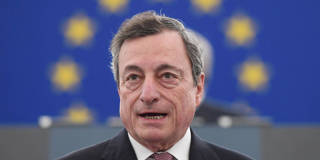The risks of further monetary stimulus measures by the European Central Bank outweigh the benefits. Additional stimulus will either amount to less than anticipated or will not be sustained – yet it could still undermine the eurozone's financial system and public finances in far-reaching ways.
PRINCETON – Mario Draghi risks deepening the eurozone’s problems in the final weeks of his eight-year term as president of the European Central Bank. He has promised that the ECB will reduce interest rates further to spur the eurozone economy. But policymakers have room for only modest rate cuts, which will do little to boost growth – and will put potentially intolerable pressure on the eurozone’s fragile banks.
Back in June, Draghi said that the ECB was preparing a new dose of stimulus, including further reductions of its policy interest rate and a renewal of quantitative easing (QE) through purchases of government bonds. And he continued to call for “a significant degree of monetary stimulus” following the ECB Governing Council’s most recent meeting on July 25.
More recently, Christine Lagarde, who is due to succeed Draghi as ECB president on November 1, said the central bank “has a broad tool kit at its disposal and must stand ready to act.” Likewise, Olli Rehn, governor of Finland’s central bank and a member of the ECB’s Governing Council, called for “substantial and sufficient” action. Financial markets thus expect aggressive “big-bang” measures from the ECB at the council’s next meeting on September 12.

PRINCETON – Mario Draghi risks deepening the eurozone’s problems in the final weeks of his eight-year term as president of the European Central Bank. He has promised that the ECB will reduce interest rates further to spur the eurozone economy. But policymakers have room for only modest rate cuts, which will do little to boost growth – and will put potentially intolerable pressure on the eurozone’s fragile banks.
Back in June, Draghi said that the ECB was preparing a new dose of stimulus, including further reductions of its policy interest rate and a renewal of quantitative easing (QE) through purchases of government bonds. And he continued to call for “a significant degree of monetary stimulus” following the ECB Governing Council’s most recent meeting on July 25.
More recently, Christine Lagarde, who is due to succeed Draghi as ECB president on November 1, said the central bank “has a broad tool kit at its disposal and must stand ready to act.” Likewise, Olli Rehn, governor of Finland’s central bank and a member of the ECB’s Governing Council, called for “substantial and sufficient” action. Financial markets thus expect aggressive “big-bang” measures from the ECB at the council’s next meeting on September 12.